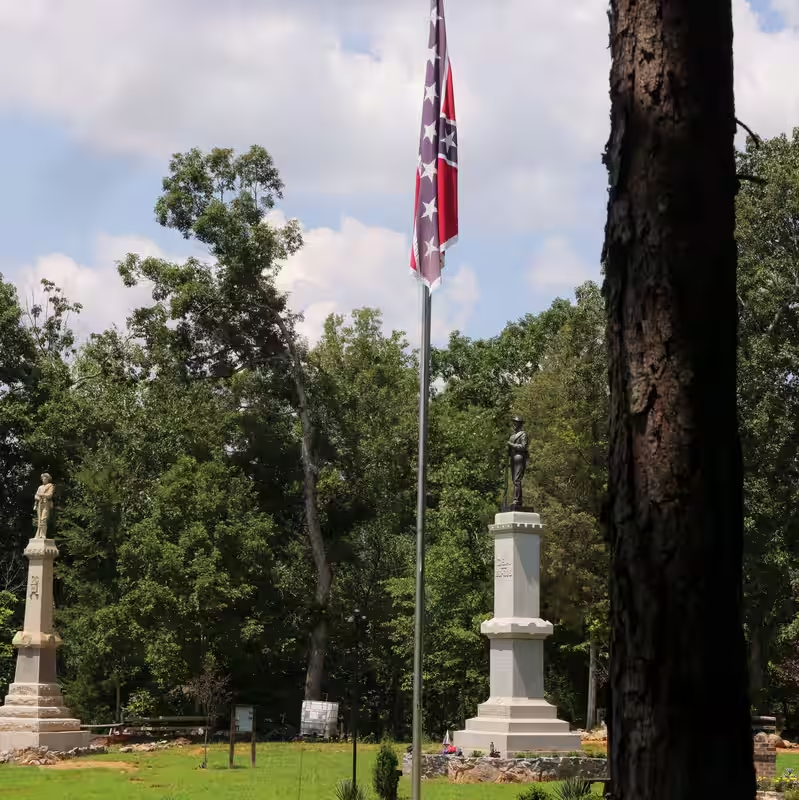Table of Contents
- Where Do Confederate Statues Go After Removal?
- North Carolina’s Law That Limits Statue Disposal
- Inside Valor Memorial: A Controversial Sanctuary
- Community Divided Over New Display
- A National Pattern in Disguise?
- Sources
Where Do Confederate Statues Go After Removal?
As cities across the U.S. have taken down Confederate monuments in recent years, a quiet but growing trend has emerged: many of these statues aren’t disappearing—they’re relocating. And in North Carolina, one private park has become a magnet for them.
Valor Memorial, a 22-acre site near Reidsville, is now home to at least five relocated Confederate statues—some standing taller than they ever did in city centers. The park, funded by private donors and operated by a nonprofit with ties to heritage groups, bills itself as a “place of honor, not hate.” But critics argue it’s a thinly veiled effort to preserve symbols of white supremacy under the guise of historical preservation.
North Carolina’s Law That Limits Statue Disposal
The movement of these monuments is shaped by a little-known but powerful state law: the Cultural History Artifact Management and Patriotism Act of 2015. This law prohibits local governments from permanently removing “objects of remembrance” on public property unless they receive a waiver from the state’s Historical Commission.
Even when removal is approved, the law mandates that statues must be “preserved and relocated to a site of similar prominence”—not destroyed, buried, or hidden away. That restriction has created a bottleneck: cities want to remove controversial monuments, but few public institutions are willing to accept them.
Enter private entities like Valor Memorial, which offer a legal—and politically convenient—solution.
Inside Valor Memorial: A Controversial Sanctuary
Opened in 2023, Valor Memorial sits on rural land once used for tobacco farming. Today, it features manicured lawns, flag-lined pathways, and bronze statues of Confederate generals like Robert E. Lee and Stonewall Jackson—each accompanied by plaques describing their “military valor” but omitting their role in defending slavery.
The park’s founder, a retired businessman and Sons of Confederate Veterans member, told local reporters: “We’re not celebrating secession. We’re honoring sacrifice.”
But historians and civil rights advocates push back. “These statues were never just about ‘valor,’” said Dr. Lena Mitchell, a professor of Southern history at UNC Chapel Hill. “They were erected during Jim Crow and the Civil Rights era to intimidate Black communities. Moving them to a private park doesn’t erase that context—it just privatizes it.”
Community Divided Over New Display
Reactions in Rockingham County are split. Some residents see Valor Memorial as a respectful compromise. “At least they’re not in front of our courthouse anymore,” said one local shop owner.
Others worry the park legitimizes a sanitized version of history. A coalition of Black churches and youth activists has called for state oversight of private monument sites, arguing they can become rallying points for extremist groups.
So far, no public events have been held at the park, but online forums linked to far-right groups have promoted it as a “pilgrimage site.”
A National Pattern in Disguise?
North Carolina isn’t alone. Similar private parks have popped up in Alabama, Georgia, and Texas. In 2024, a former plantation in Mississippi reopened as a “Southern Heritage Preserve” featuring dozens of relocated Confederate markers.
Legal scholars warn that without transparency laws, these sites operate in a gray zone—free from public records requests, community input, or historical accountability.
“We’ve traded public monuments for private mythmaking,” said legal historian Marcus Boone. “And that’s harder to challenge.”




